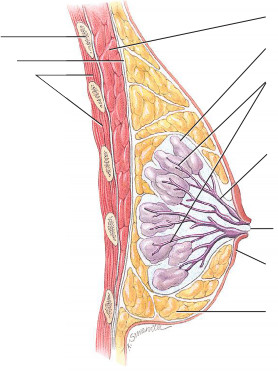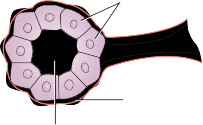Fundamentals of Midwifery: A Textbook for Students (97 page)
Read Fundamentals of Midwifery: A Textbook for Students Online
Authors: Louise Lewis

BOOK: Fundamentals of Midwifery: A Textbook for Students
12.28Mb size Format: txt, pdf, ePub
Infant feeding

Chapter 10

'\_;,
Key
points
Infant feeding choices are influenced by social,cultural and emotional factors.
Providing evidence-based information and support to a mother and partner to ensure their baby receives adequate nutrition is a fundamental role of the midwife.
Understanding the physiology of the breast and lactation is necessary to be able to support mothers effectively to initiate and maintain breastfeeding.
Early recognition and appropriate management of breastfeeding complications is a fundamental skill of the midwife.
Understanding the principles of safe formula preparation and feeding is necessary to be able to give parents evidence based information.

Conclusion
Evidence suggests that improving the initiation and duration of breastfeeding will help towards reducing health inequalities. Midwives and health professionals need to be aware of the factors influencing a woman's decisions in infant feeding and ensure that the best available evidence is applied to clinical practice
.
The care provided should be culturally sensitive
,
family-centred and responsive to individual needs, respecting values and beliefs. All women need to be sup ported in their choice of infant feeding and receive consistent information and guidance in order to maintain the infant's nutritional requirements and to foster confidence in the mother and her partner.
End of chapter activities
Crossword


Across
Hormone released by the posterior pituitary
8.
The alveoli consist of a single layer of milk- gland causing myoepithelial cells to contract. producing secretory cells called
8.
The alveoli consist of a single layer of milk- gland causing myoepithelial cells to contract. producing secretory cells called
Lactogenesis II is stimulated by a sudden
9.
Decreased milk production is due to the lac- drop in this hormone. tocytes being too
9.
Decreased milk production is due to the lac- drop in this hormone. tocytes being too
7.
Ducts that are found 5–8 millimeters from the nipple opening.
Down
1.
Cells surrounding the alveoli.
6.
Has a negative effect on milk production.
The fat content of a breastfeed is higher at the
7.
Glandular tissue within the breast are
7.
Glandular tissue within the breast are
Hormone responsible for milk synthesis. arranged in these.
232
Label the diagram


Find out more
Below is a list of things you can find out about to enhance your knowledge of the issues and topics covered in this chapter. Make notes using the chapter content, the references and further reading identified, local policies and guidelines and discussions with colleagues.

1.
Read the infant feeding policy in the local hospital.
2.
Seek the opportunity to spend time with a breastfeeding peer supporter and infant-feeding co-ordinator or lactational consultant.
3.
Read the International Code of Marketing of Breastmilk Substitutes and consider how this applies to clinical practice. [Available online] http://www.unicef.org/nutrition/files/nutrition_code_english.pdf
4.
For more information visit: http://www.unicef.or
g.uk/babyfriendly/ www.tongue-tie.org
.uk/ http://www.ibreastfeed.co
.uk/ http://www.breastfeedingnetwork.org
.uk/ http://www.lcgb.org/
233

Glossary of terms


Other books
The Collector by Cameron
Plutocrats: The Rise of the New Global Super-Rich and the Fall of Everyone Else by Chrystia Freeland
A Sticky Situation by Jessie Crockett
Expatriados by Chris Pavone
Slow Recoil by C.B. Forrest
Magpie Hall by Rachael King
WebMage by Kelly Mccullough
Night Is Mine by Buchman, M. L.
Death of a Stranger by Anne Perry
Transformers Dark of the Moon by David, Peter